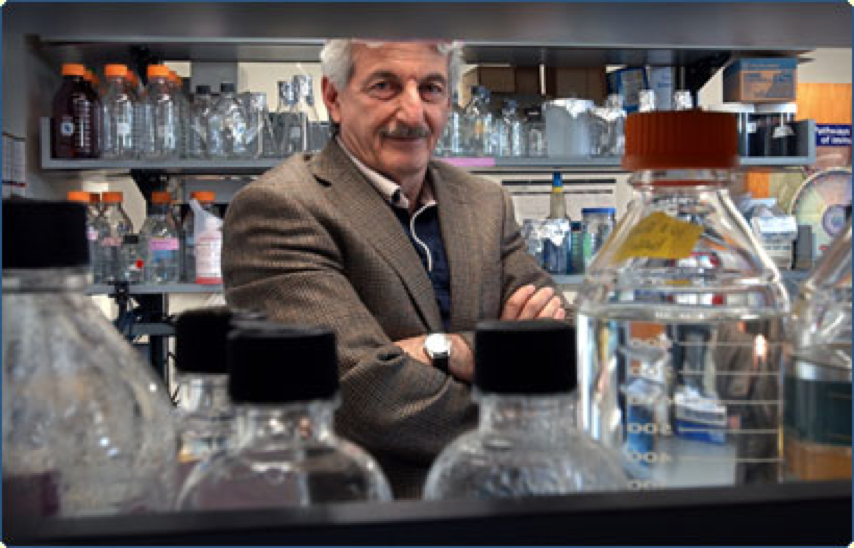-
About
- Leadership & Faculty
- News & Events
-
Academics
- Graduate
- Advanced Clinical Training
- Continuing Education
- Academic Departments
- Academic Offices
- Simulation Experiences
-
Student Life
- Offices
-
Research
-
Hospitals & Clinics
- Emergency Care
- Hospital Services
-
Community Outreach
- Volunteer
Dr. Saul Tzipori’s Journey
“My journey started 60 years ago,” began Dr. Saul Tzipori, “I was 15 years old, growing up in Israel.”

“My journey started 60 years ago,” began Dr. Saul Tzipori, “I was 15 years old, growing up in Israel.”
The early years
Growing up on a kibbutz in Israel, Saul Tzipori dreamed of being a dairy veterinarian. While other teenagers went to high school, he woke up every morning and milked 100 cows, repeating the same in the evening. When the veterinarian arrived midmorning, Saul accompanied him on rounds, examining the cow stalls and managing herd health. Saul was in awe of this man who had so much knowledge and so highly skilled; he knew that that’s what he would want to become one day.
However, there were a few challenges in his path. First, there wasn’t a veterinary school in Israel. Second, he hadn’t been to high school. And third, there was a mandatory three and half years of military service. Undeterred, Saul completed his time in the military, passed high school equivalency exams, took a rapid English course, and was accepted into a veterinary school in Australia. At age 25, he started the five-year degree program, hoping to make it through on his minimal English and little background in biology and science, in order to return to Israel as a veterinarian.
Now, over 50 years later, Dr. Saul Tzipori heads the Department of Infectious Disease and Global Health at Cummings School of Veterinary Medicine. A world renowned research scientist in the area of diarrheal diseases, he has four degrees after his name. He has developed, and continues to develop, innovative vaccines to address serious diseases affecting humans using his veterinary skills. He has mentored numerous students and junior faculty who have gone on to make significant scientific contributions. And, it all started with, you guessed it, dairy cows.
The Ph.D. years
In his final year of veterinary school, Dr. Tzipori conducted research on Brucellosis, a bacterial disease affecting cattle. By the end of the project, he’d been bitten by the microbiology bug. As he finished his D.V.M., he began planning his next step: a Ph.D. in Virology.
As a Ph.D. student, Dr. Tzipori studied Bovine Ephemeral Fever virus by day, and practiced veterinary medicine by night. By the end of his Ph.D. program, he’d developed a vaccine that successfully protected cows against the disease; it was used commercially. With his skills as a veterinarian and scientific expertise, Dr. Tzipori was able to devote his career to translational research and the development of vaccines and therapeutics.
The veterinary scientist years
In 1976, Dr. Tzipori began working at the Attwood Institute as Veterinary Scientist and section head studying diarrheal diseases of food animals. At the time, many of the most common enteric diseases were unknown, or uncharacterized. Through his work at the Attwood Institute, Dr. Tzipori helped identify and research Enterotoxigenic Escherichia coli (E.coli), Rotavirus, Coronavirus, and Cryptosporidium, which became his main area of focus since. Over the course of ten years he published fifty-five papers on enteric pathogens, prompting the University of Melbourne to award him with a Doctorate of Veterinary Science. It was the third such award ever given by the university.
After twenty years in Australia, Dr. Tzipori left to apply his expertise in veterinary science in a surprising setting: the Royal Children’s Hospital in Melbourne. With a reputation as an expert in the field of diarrheal diseases in domestic animals, Dr. Tzipori was able to directly apply his expertise to investigate and develop preventive measures against diarrheal diseases in children, making him one of the pioneers in the field of comparative medicine.
From the Royal Children’s Hospital he went on to the epicenter of enteric disease research: the International Center for Diarrheal Diseases Research in Bangladesh, best known as ICDDR,B. There he oversaw hospital diagnostic labs, coordinated large field vaccination trials, trained scientists in virology, pathology, parasitology, molecular genetics and vaccinology service and investigational units. He also performed veterinary services for expatriates’ pets and was consultant at the local zoo, where he has fond memories of treating lions and camels.
The Cummings School years
Dr. Tzipori joined Cummings School of Veterinary Medicine at Tufts University in 1991 to establish an infectious disease program. Under his leadership, the program has expanded substantially, first becoming the Division of Infectious Diseases, and then into a department.
Today, the Department of Infectious Disease and Global Health occupies cutting edge facilities with top scientists studying a wide range of diseases. Dr. Tzipori has continued his mission of prevention and mitigation of infectious diseases of global importance, while lecturing, mentoring, and lending his leadership to the department.
One evening this fall, Dr. Tzipori presented his career to students at an International Veterinary Medicine forum on campus. He told them, “If you take anything from this talk, it’s this: keep an open mind. You never know what you will end up doing, and where.” It’s a motto that Dr. Tzipori continues to live by, 60 years into his extraordinary career.
Department:
Dept. of Infectious Disease and Global Health